#Strahd for love of Tatyana
Text
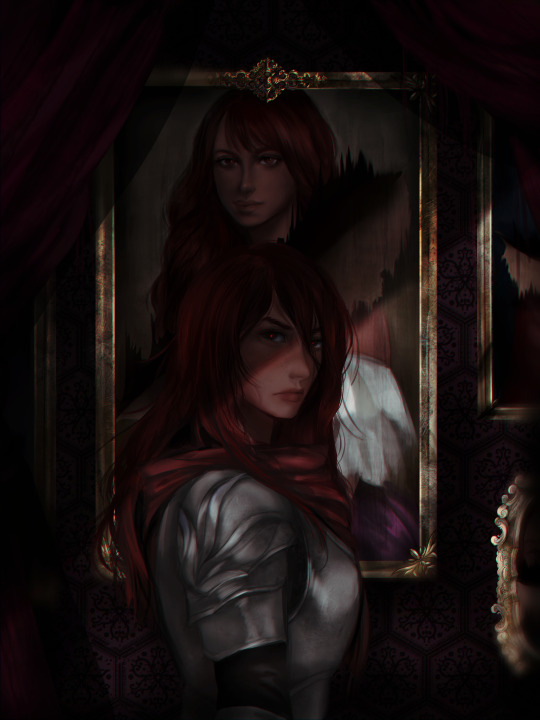

Legacy
#ireena kolyana#tatyana federovna#curse of strahd#cos#curse of strahd spoilers#cos spoilers#my art#i love strahd but i think ireena dserves to beat her up :)
978 notes
·
View notes
Text

I tell you how you kill me in my dreams.
—
Dima was visited by the local vampire. She will bite him back, next time. Alt version under the cut.
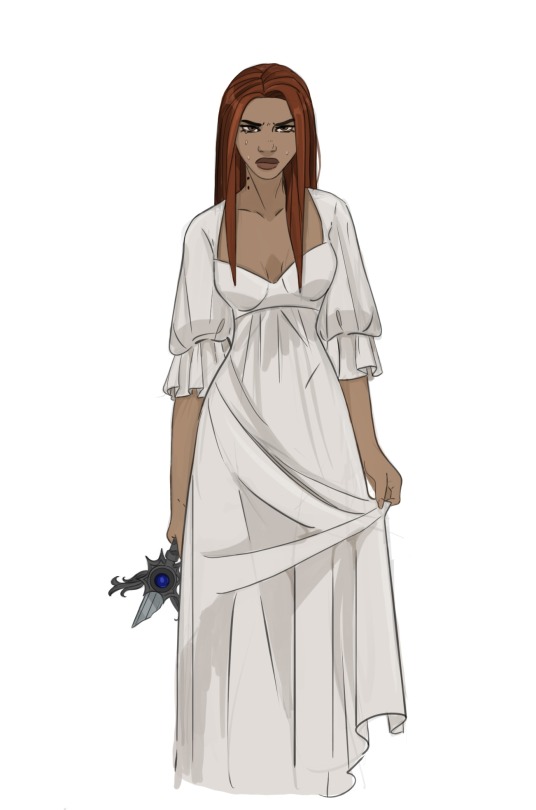
#I love you Tatyana PCs I love you doomed PC narratives I love you dhampir PCs who can’t control themselves I love you death-seeking maidens#to be a dhampir in curse of strahd is to be both predator and prey. I love it.#idk if anyone elses campaigns use Dark Kiss rules from VRGtV but it’s a unique fear and I recommend it if you do Ireena/Taty PC#anyway enough of my yappin#curse of strahd#dungeons and dragons#dnd character#dnd#dnd fanart#dungeons and dragons art#cos: the sorority#CoS PC: Demetria#I don’t mind this being use in place of Ireena if you so wish. She is an Ireena pc after all.#curse of strahd pc#oh yeah. more yapping. strahd took my fucking sword from me again!#I am going to steal something out of his fucking house again!#song is Hanging by Marika Hackman
177 notes
·
View notes
Text
Sometimes I see posts about how "I, Strahd" Tatyana has the personality of a cardboard but I don't think I agree honestly.
We only see her in very few scenes (all from Strahd's POV) and she's always very gentle and soft spoken.
Which makes completely sense since she was a lowborn orphan trying to make a good impression on her future brother in law, who is not only the ruler of the valley but also a feared war criminal. Of course she would try to be as nice as possible in front of him.
I also think that Strahd was extremely genuine in thinking he was in love with Tatyana, it's just that he never really knew her the way Sergei did. He only knew a facet.
#she went customer service mode#Strahd mentions that in the months she stays at Ravenloft he finds new reasons to fall in love with her day after day#so even if his attraction to her was absolutely superficial at first I do think he really liked her going on#he's so difficult to please I think he would have just tried to fish for other reasons to dislike her if his attraction wasn't genuine#especially because he really wanted to hate her before meeting her#also being just kind and gentle is a completely valid personality honestly#I don't think she's any less interesting or well rounded just because we're mainly shown that side of her#plus I say she's soft spoken but she also curses the gods when Sergei dies and immediately thinks of looking for Lady Ilona to bring himbac#so we could say she's also resolute and very quick thinking#also I was thinking of Tatyana as a general concept at first but then I remembered they completely changed her in 5e#so her dyamic with Strahd is obviously different cause they also knew eachother before Sergei arrived#because god fucking forbid 5e Strahd to fall in love with a peasant I guess#in the beautiful world in my mind I often forget I Strahd isn't the 5e canon oof#this post was brought to you by the Taty Appreciators Gang#not art#curse of strahd#strahd von zarovich#ravenloft
64 notes
·
View notes
Text
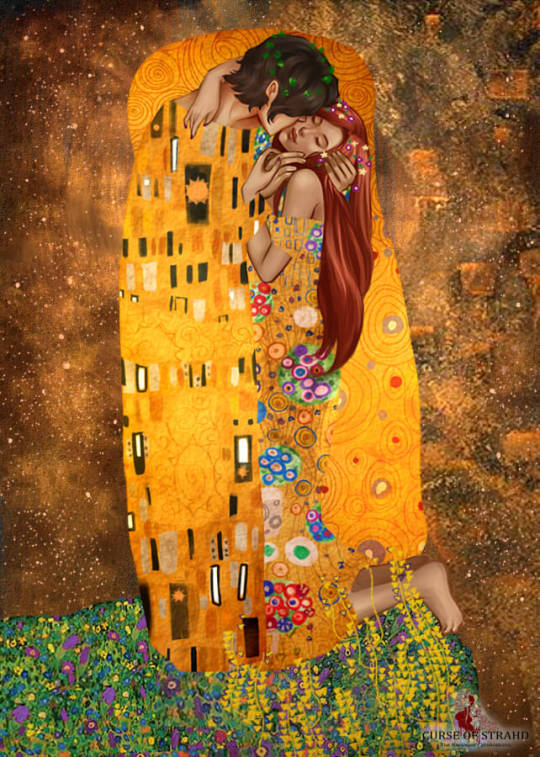
The Kiss
Based on Gustav Klimt's The Kiss portrayed by Sergei Von Zarovich and Tatyana Federovna. This is actually a remaster of an old piece I already did.
#ravenloft#barovia#dnd#strahd von zarovich#strahd#the ravenloft wanderers#curse of strahd#vampire#tatyana federovna#ireena kolyanovich#sergei von zarovich#OH TO BE IN LOVE LIKE THEM AHHHHH
118 notes
·
View notes
Text
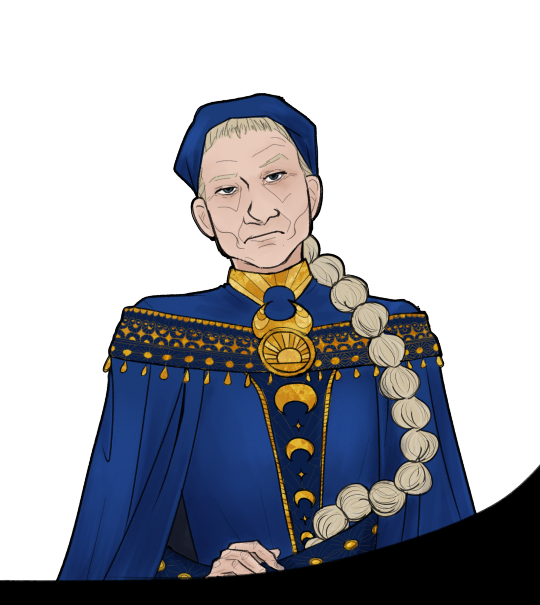
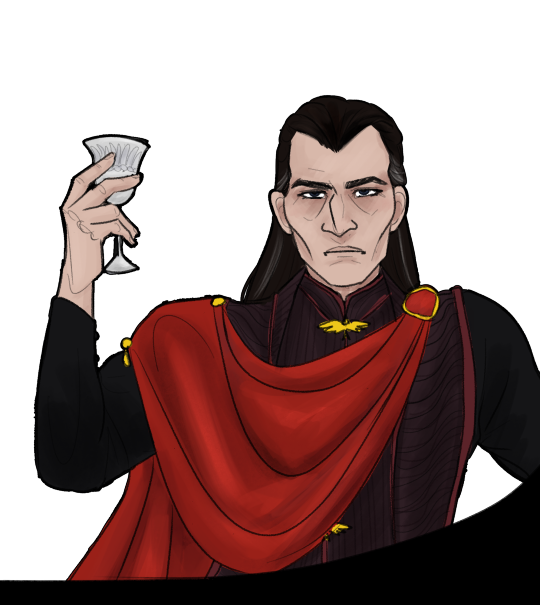
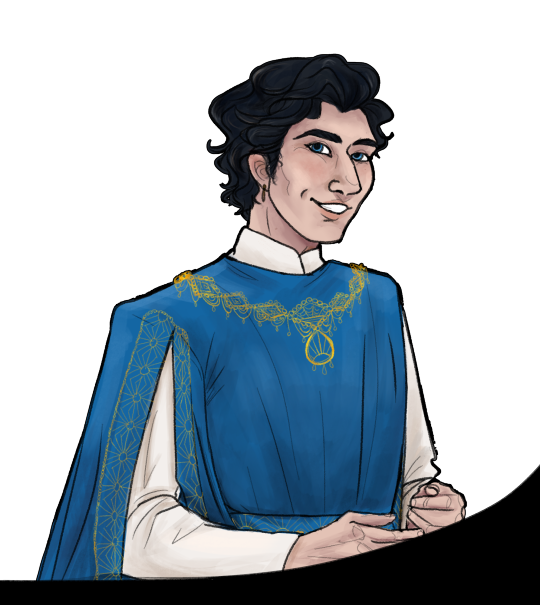

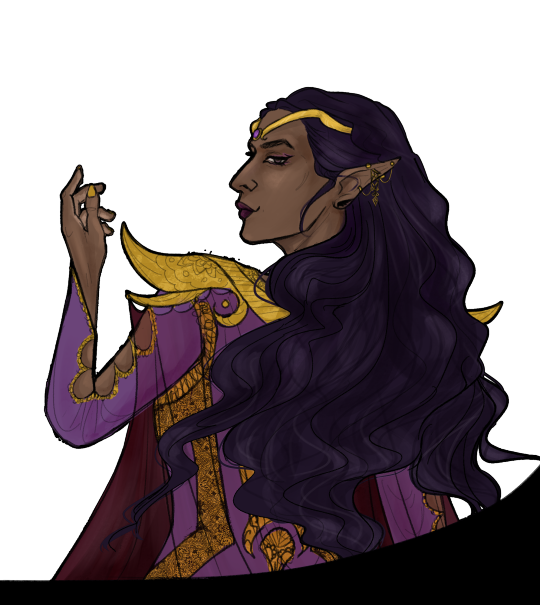
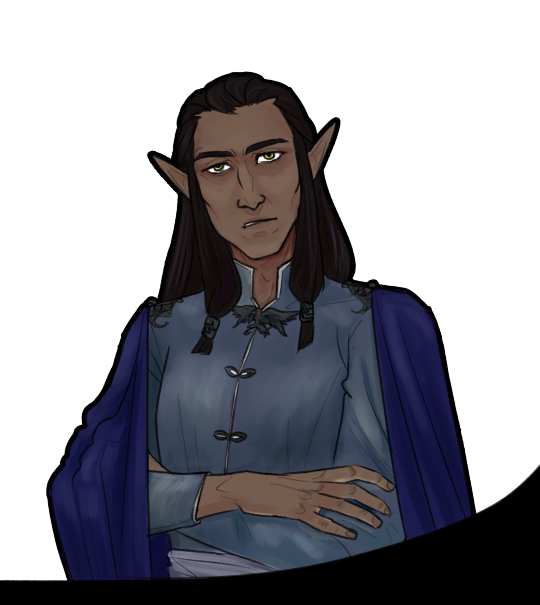
pov you're seated at a dinner table and these are the other guests wdyd
#rare art post. as promised#made for chapter four of interactive tome of strahd cuz i thought hey. why not a visual novel#alright characters in order of appearance:#lady ilona darovnya#strahd von zarovich#sergei von zarovich#tatyana federovna#patrina velikovna#rahadin#no! that's not how i like to draw strahd! i just had to finish it in approx 30 minutes before the session#rahadin is specifically young here that's why he's missing some of his features#i imagine he got his fun forehead scar at a later date than this#also if anyone clocks what outfit sergei's is heavily inspired by no you didn't. unsee it now.#patrina#my beloved#i love her so much and also one of my players put it so well#patrina: queen of the universe#kasimir: wet tissue#ah one more tag#curse of strahd#strahdtober#strahdtober2023#cos#ravenloft#my art
63 notes
·
View notes
Text
3E Ireena: Who are you?
5E Ireena: I'm you but weaker.
3E Ireena:
5E Ireena:
3E Ireena: Take me to the castle right now so I can kick his fucking undead ass right this instant.
#dungeons and dragons#dungeons & dragons#dnd#d&d#curse of strahd#ireena kolyana#tatyana federovna#strahd von zarovich#expedition to castle ravenloft#as;dflajs;ags;lh FULL DISCLOSURE LISTEN. I LOVE HER. I LOVE 5E IREENA TOO OK#BUT IM READING THE 3E STAT BLOCK AND THE DIFFERENCES IN HER WRITING IN THIS VERSION AND. GODDAMN#on one hand: there's a TON of room to tweak her for DMs#you can make her a sidekick! you can make her a badass fighter OR you can keep her noble stat block and focus on using her creatively#in other ways socially. you can make ireena really cool without being a frontline badass or have her grow into the role over time#BUT ALSO i feel like 3e ireena has a much more defined and badass personality written into her#and actually gives her a reason to be rocking that badass armor and wanting to take an active stance against freeing herself from strahd#and storming the castle#it's just so... gaaaah#starposts
38 notes
·
View notes
Text
Ok is it Strahd von ZA-ro-vich or Strahd von za-RO-vich
#strahd von zarovich#the curse of strahd#dnd#ravenloft#I was re-reading the official book/guide for the module or whatever and there is actually so much lore#ok also I Strahd is hilarious bc Tatyana isn’t really even it out that much and only comes in about half way from what I remember#I liked reading about the army stuff#And by reading I mean listening to the audiobook lol#I wish I could still play ddo bc I loved this expansion sm 😭
24 notes
·
View notes
Text
making the player the reincarnation of tatyana is out! making the player the reincarnation of sergei is in!!!
#ama mumbles#curse of strahd#i love tatyana pcs but also i think being sergei is so juicy#that or making vasili sergei's reincarnation instead of just strahd in disguise#or trapping sergeis soul in the sunsword ❤
13 notes
·
View notes
Text
like, why would you choose to forgo the inherent romance of strahd's character. like, the whole point was that he doomed barovia for love. i get that d&d is a fantasy game etc etc and that most of its focus is on conflict and combat and such but come on. why would you sideline the most important aspect of his being: that he is a villain who fell onto love like a sword
#🦌#curse of strahd#also he literally did he was killed by tatyana HALSJDK#not to pick bones and such but dms who toss away the part of him that longs for tatyana are ehhh#(i'm mainly talking about folks on reddit looool lol)#(who think that being a vampire means being an abuser or??? something????)#like okay i'd get it if romance is something you wouldn't want to play too much but why pick strahd....#a villain who was created BY LOVE#anyway blorbov from d&d game...he is everything to me
16 notes
·
View notes
Text
Ireena High School Host Club
The party has decided they like Ireena. The Dhampir is still not best pleased Vasili von Holtz is trying to get close to her but our session today was too short to get much development... we just toured Vallaki since one of our players was absent and I still haven’t finished mapping all of the nonsense happening in that friggin town.
However. The artificer pointed out that Ireena’s reverse harem situation maps pretty well onto Ouran High School Host Club.
They proceeded to match everyone up.
Ireena is obviously Haruhi, the lone girl.
The blonde noble swashbuckler with his fancy clothes is obviously Tamaki.
The dhampir (day job: debt collector) is Kyoya.
The tiny halfling cleric bought a stuffed bear at Blinsky’s Toys. He must be Honey.
The goliath who has decided his purpose in life is to literally carry the cleric around like a backpack is Mori-Senpai.
Which leaves the dragonborn rogue and the kobold artificer as the twins.
Vasili has somewhat invited himself as part of the party and is the only one who does not fit this mapping... appropriate since he is, well, Vasili von Holtz. The party has decided he’s a harmless himbo.
At the end of the session, I sadly remarked, “Aww. I didn’t get to use any of my vampire dice.”
Party: What, you didn’t roll Strahd on the random encounter table?
Me: Why would Strahd be interested in your tour of Vallaki?
#kiss kiss fall in love#vampire kiss anyway#ouran high school: barovia edition#curse of strahd#dungeons and dragons#poor Ireena Kolyana#Tatyana's spirit does not deserve wacky hijinks
3 notes
·
View notes
Text
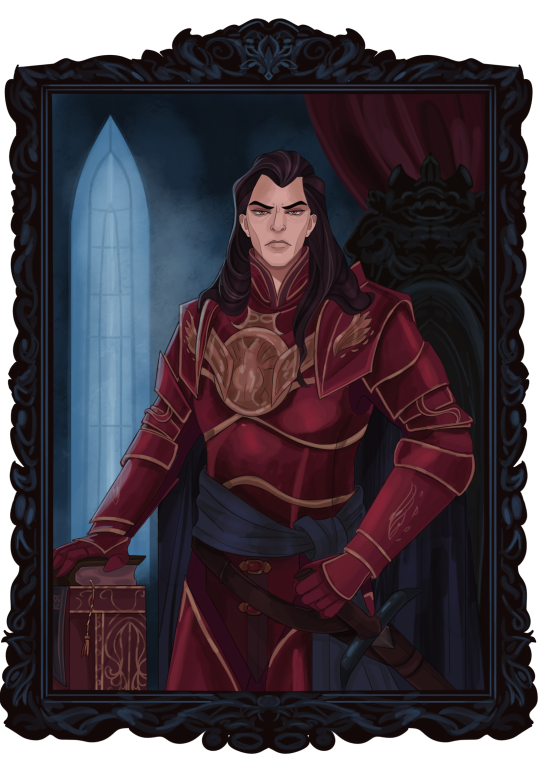
A dark heart is beating and waiting for you.
Another work for my DM, this time a redraw of the living Strahd portrait.
#curse of strahd#I WON’T ELABORATE#jk LMAO you know I love my elaborations#Ravenloft is going. badly. tried to run from strahd and got gaslit for my trouble.#just pc tatyana things#met varushka and that might be coming if I can finish commissions#curse of strahd art#dnd strahd#strahd von zarovich#barovia#ravenloft#dungeons and dragons character#dungeons and dragons art#dungeons and dragons#dnd fanart#dnd npc#dnd character#dnd art#dnd
373 notes
·
View notes
Text

a little hc I have about Ascended Astarion cont (possible spoilers about act 3) under the cut
I've been thinking a lot about how once you ascend him about how once pure emotions get twisted by undeath. How love turns to hungry obsession (think Strahd and Tatyana). Even if you leave him, even after he coldly spouts cruel words at you in response, admits how he would have twisted your love for him (he def would). I couldn't help but think "is it really over? Just like that?", I get the sinking suspicion that it's not really over. Especially after he says you will regret leaving him so bitterly. Maybe he'll give you a couple of years of freedom, but in the end he will come for you.
Well enjoy this "supposed to be simple" sketch of Vampire Lord Astarion having a party, deciding whether or not to end it in a blood bath (nah but it's a funny thought. Being civilly minded is hard) because he doesn't like people touching his things.
#inktober#baldur's gate 3#bg3#astarion#baldur's gate iii#bg3 astarion#baldur's gate 3 astarion#ascended astarion#baldurs gate astarion#bg3 dark urge#bg3 durge#bg3 tav#vampire#my art
13K notes
·
View notes
Text

Can you believe we had more than a year without Strahd-the-responsible-dad™ here?
Illustration for @blazingemstone. Thank you again for this lovely commission!
Strahd and their PC Anastasia, Strahd's daughter from one of the previous Tatyana's reincarnations.
Some close-ups below
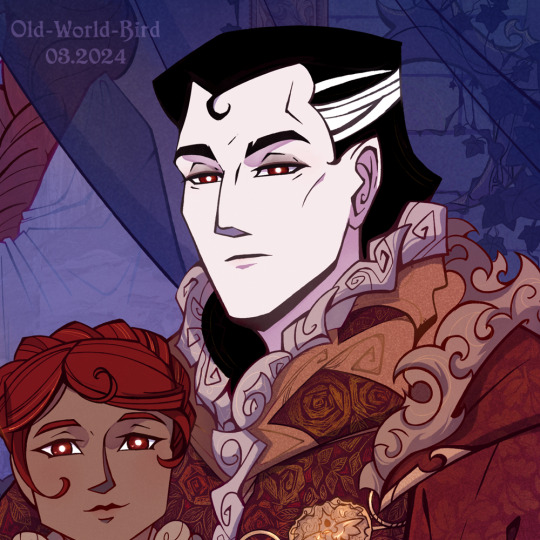
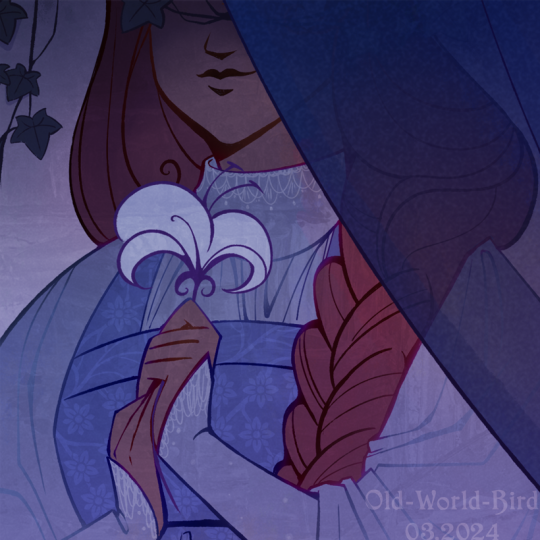
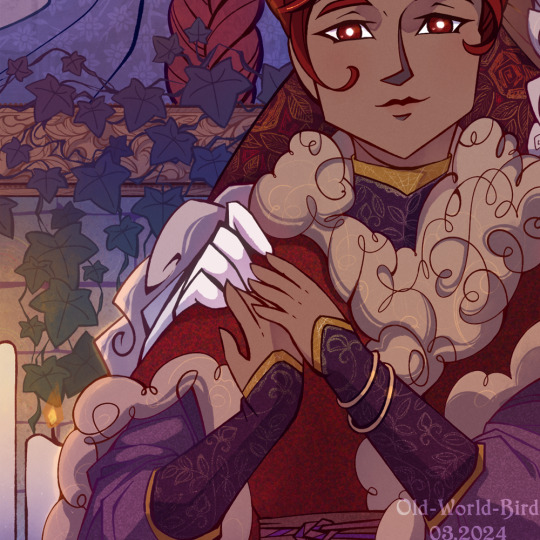

More info about commissions here
#oh boi it's good to be back to these for a change#curse of strahd#strahd von zarovich#anastasia von zarovich#tatyana federovna#ravenloft#dnd#art commissions#slavic strahd#artist on tumblr
176 notes
·
View notes
Text
Why do Tatyana PCs never run any race besides like Human/Elf adjacent. Why are there no Tatyana Kenkus or Tortles. Why are you afraid of Strahd being in love with a Kuo-Toa
178 notes
·
View notes
Text
I, Strahd: a subversion of fantasy romance
There's so many ways to pick apart the book I, Strahd. It's a gold mine of essay-fodder.
But, here, I examine how Strahd+Tatyana's narrative flips fantasy romance tropes on their heads, and gives us a tragic critique on these tropes as a whole.
(If you want idea for narrative nuances to add to your games, you may especially want to take a peek.)
(If you simply also like Ravenloft lore and picking apart why Strahd is a hot mess, then you're in good company below.)
Imagine a paladin returning from war to the home town he’d fought to save. Imagine this paladin falling in love with a woman who represents the innocence and beauty he lost during his quest to save those he was sworn to protect. She is kind to the core, and still sees good, sees beauty, in a world the paladin thought broken long ago.
He falls for her, softens, and begins to dote on her. He brings her flowers on a summer’s eve and finds himself happy for the first time in so many years whenever she is near.
And yet- when time comes to ask for her courtship- he finds she has fallen for a man who has never seen the likes of war. A spoiled, naïve, fop.
(If this sounds like the plot of Pretty in Pink, then you’re spot on. That film also follows this trope to a tee.)
This is a tragedy to us, a study of man’s sacrifice being rejected. How, despite all he has given, he could not be happy in the end. Or, if our paladin, our hero, did “get the girl”, it’s seen as a love story. It shows how the paladin’s merit does get rewarded, how fulfilling his role nets him a happy ending.
I, Strahd: Memoirs of a Vampire by P.N. Elrod takes this trope, this literary perception, and gives us a very bleak (almost darkly satirical) spin.
Strahd (especially in the book) is not a likable person. He is blunt, empathetically deficient, perpetually irritable, and an all-around cynical grouch. And his tale is framed in the least flattering light imaginable; his own, very bitchy, words.
And this is where P.N. Elrod’s subversion of the narrative trope begins. Elrod has effectively taken away the familiar framework, shattered those rose-colored glasses. Instead of presenting us a third-person narrative of a palatably war-weary soul, she gives us this empathy-zero, paranoid, asshole who forgot how to smile ages ago. In essence, we got someone realistically fucked up.
Yet, we are still in the realm of fantasy. Of magic, monsters, demons, and happy endings. The character strives to make the same journey as his counterparts of similar worlds. He finds a girl who represents that innocence lost and seeks to win her heart.
Except, this is a story of twisted realism. Yes, the drive to follow such a narrative arc and conclude the happily ever after, or sanitized hero’s tragedy, reigns supreme. But the “hero’s” personality, his actions, and the fallout are not bound by any deus-ex-machina rose tinted pallatability.
A very real, flawed, person is made to follow the narrative, and fails, miserably. Not only fails, but leads to a cataclysmic disaster which effectively fucks over everything he’d spent a lifetime regaining and protecting.
I, Strahd shows us what actually happens when a man follows this narrative trope in high fantasy. It critiques the absurdity of thinking that such a mindset could bring a happy ending for any involved, or that the tragedy that ensues would be anything remotely close to romantic.
Strahd condemns the country he’d fought for to a hell of his own making. His quest to complete that destined arc leads to the brutal death of the woman, of the innocence, his narrative role says he’s supposed to claim. The tragedy that ensues isn’t the sanitized sorrow of similar tales, but years of deep depression and isolation. It’s not pretty. Not pretty at all.
And it’s uncomfortable, as readers, to watch unfold. Some are quick to remedy this tale with headcannons of the pair reuniting. Others quickly jump to sweeping condemnations of the idiot who got himself into this mess. Yet both of these are merely mental Band-Aids to try and reconcile the discomfort of watching a trope we should know, completely fall to ribbons.
I am not going to waste my breath with a lengthy disclaimer on how Strahd is an awful person and that I understand that. Because this “essay” isn’t about the nitty gritty of the fateful series of fuck-ups that gave us Ravenloft. This essay is a look at how tropes and narratives are subverted and picked apart by I, Strahd. So please, save your fingers, and keep critiques of me not tackling this- at bay. (In the future, I will possibly do an in-depth post examining his morality and culpability. But that post is not now.)
P.N. Elrod lays bare how flawed and, frankly, dangerous the narrative of male-centric works-righteousness romance is. The woman, the damsel, in the story is reduced to a cardboard cut-out by the narrative trope, and then brutally dies. The trope kills her, metaphorically, and pretty damn blatantly.
The man, the “hero”, in the story self-destructs and plunges himself into his own personal hell. The trope destroys him, also metaphorically and exceedingly blatantly.
It’s a heavy handed point to make, but the point hits home; the trope is lethal to women.
And it is also exceedingly damaging to men.
If the story ended there, with Strahd locked in eternal depression (or ending his life) surrounded by the shambles of his world, I, Strahd would still be a very poignant critique such fundamentally flawed romantic tropes…
But, it doesn’t end there. Instead, the cycle, the drive to complete this rose-tinted trope, begins anew. Tatyana reemerges, in different faces, different forms, lifetimes apart. He strives to either win her heart, or conclude his arc in a sanitized tragedy- for both paths will reach the same tropey conclusion we are supposed to see.
And he never does.
Unlike heroes in other tales of this sort, he’s realistically flawed and written to be an actual person. He’s not a knight in shining armor. He’s a cynical, empathy-deficient, introverted jackass. He’s cynical and empathy-deficient because he’s seen the worst mankind has to offer in war, and is realistically unpleasant because of that. He’s an introverted jackass because introverted jackasses exist. Because there’s no actual laws against introverted jackasses being stuck in such a narrative role.
(And may I say, it’s refreshing to see fellow introverted jackass representation)
The role of female cardboard cutout (sorry Tatyana) is a disservice to women and frankly dangerous if you think it over. But the role of paper mâché hero is what keeps the cycle going. If you make the cardboard a person in such a narrative, you get a skin-crawling horror story. If you make the paper mâché a person, you see a gut-wrenching cycle of personal agony. If you make both of them people, you see a horrifying, climactic, dystopian nightmare.
In this day and age, it is easier for an audience to quickly humanize the cardboard cut-out, especially for women/AFAB individuals. Reading I, Strahd with Tatyana’s perspective in mind is skin-crawlingly terrifying. And, even though Elrod is telling the tale from Strahd’s perspective, she does a good job of weaving in where Tatyana actually is mentally. Our looking glass is skewed by the narrative POV of paper mâché hero that we’re stuck in. But we can still hear the screams off-screen, so to speak. We can still see those brief glimpses of mannerisms and terror that us outsiders clearly interpret as a very real person stuck in a horror story. Tatyana, though she isn’t the focus of the tale, is a person.
What makes I, Strahd unique, however, is that Strahd is a person too. And, in all honesty, that’s not something we see very often. He’s not a sanitized and likable hero, but he’s also (let’s admit) not a completely despicable and bland “bad guy”.
Elrod makes both of them people, which brings a complete picture of a nightmare. A full critique of the dangers of such narratives in our modern tales. And we get to see the nightmare played over, and over, and over again.
I’ve steered away from using preachy or ‘political’ language thus far, but the crux of this “essay” does come down to a final point in that general area. Because art, more often than we’d care to admit, imitates life. Many stories we have told have been framed by the roles we are “supposed” to fill, and the arcs we are “supposed” to complete.
In the trope we examined today, male heroes are “supposed” to claim a woman, their ‘salvation’, and if rejected, are shown they will be reduced to ashes. Women are “supposed” to be innocent damsels and must embody innocence and salvation for the man and are terrible little fools if they turn the hero away. Assuming the narrative even gives the woman enough nuance to actually be semi-admonished by the audience for such a rejection.
P.N. Elrod shows us the realistic folly of such a trope to disastrous proportions. She takes this tropey daydream and makes us watch as her story reveals the nightmare for what it is; a cycle of horror, pain, and increasingly depressing journal entries.
(If you read this far, congratulations! Have a cookie 🍪
My quick final disclaimers, are that this is simply examining how tropes are used and subverted. I'm not getting into the personal morality of characters and their actions, nor am I condoning them. This is an overview, in the end, of narrative structure.
Also, I am writing this examination of mens roles in tropes as a queer afab person. I don't have a dog in this fight, so, supposedly that makes this vaguely more objective.
(For followers or folks who saw me around and then didn't for like 5 months- Hi, I'm alive! I just don't have time to write during the academic year.)
#strahd von zarovich#in this essay i will#curse of strahd#ravenloft#strahd#dnd#tumblrloft#barovia#narrative critique#catslug essay
99 notes
·
View notes
Text
My Problem With Countess Strahd
I know I'm going to get flack on the lesbian vampire website for disliking the lesbian vampire, but the truth is I don't dislike genderbending Strahd, what I dislike is the way she is implemented, partly this is because there is a very popular fan supplement that does exactly what I DON'T want to see in a female Strahd.
Spoilers below the cut, and also bitching
I understand why some DMs want to genderbend Strahd. Maybe the themes of abuse that come with the story are more palatable when it's a woman doing the abuse. Maybe bisexual vampire lady sexy. Maybe the DM can't do male voices. As I said, nothing wrong with wanting Countess Strahd, the problem comes in how she's portrayed.
Strahd's character is fairly well known. A powerful and intelligent general, he turned to dark powers out of a fear of his own mortality. Right off the bat, that's a great villain, regardless of gender. But so many people who want "female Strahd" don't settle for "male Strahd but with different pronouns, they want to make her...A Woman.
The DMs who genderbend Strahd always feel compelled to change major aspects of her character and backstory. And THAT is where I start to have problems.
When it comes to the personality, rather than play him as the arrogant, commanding, lawful evil monster he is, female Strahd tends to be a seductress who manipulates her way to the top of the pile, using her looks and Feminine Wiles to get what she wants. Gone is the commanding and deadly attitude, now she's someone who lurks in the shadows, often lying to the party and claiming she's much less dangerous than she really is.
Which ties back into the backstory changes. Strahd was the firstborn son, raised to be a king and a general, spending his entire life at war. Female Strahd never gets to be a general or a king. The story is always changed so she is forced to marry a man (usually abusive) and all she wants is to be taken seriously for her big brain. Her resentment toward Sergei is changed so that, rather than being jealous that he had an easy life and she had to fight, he gets to be king and she is passed over.
"This makes sense" a DM says, "that a woman in ye olde timese would want to be king but couldn't." Except it only makes sense because you decided that Strahd's homeland was a patriarchal society. Except we know almost nothing about Strahd's homeland and what little we do know does not suggest a firstborn daughter couldn't rule. You're literally making up sexism where it doesn't exist. All in the name of making Strahd a grrrlboss struggling to Fight The Patriarchy!
Usually this leads to problems, when you make a female Strahd with a more sympathetic backstory than male Strahd, 9/10 times the DM goes running to the CoS DM subreddit crying 'my players want to redeem Strahd what do I doooo???'
The handling of Ireena and Tatyana is perhaps the most varied change with a female Strahd. Some just have her be bisexual and chasing after a female Ireena, some have her be bisexual and chasing after a male Ireena or Ismark. If Tatyana is a woman a DM will often make it so either Strahd couldn't confess because "that's forbidden love!" or she and Tatyana were having an affair but that mean Sergei forced Tatyana to marry him (once again back to the "I've made female Strahd more sympathetic than male Strahd" problem). Sometimes things get...weird like changing it so Strahd is actually Tatyana's abusive mother, which is an oddly common thing. A female villain MUST be a mother, because that's a plot for Women.
Incidentally, this is similar to the reason why most Villain Tatyana leave a bad taste in my mouth. Tatyana is a character we get no unbiased information about, what little there is about her in Official Books is written from the point of view of Strahd who, being in love with her, is the most biased a person can get. What we do know of her is that she was ultimately a victim, of Strahd, of Sergei, and of the games cosmic forces played with their lives. She is strong, yes, breaking free of a vampire and throwing herself off a cliff rather than just 'giving in' takes strength. But ultimately she was the victim, she was the one who suffered the most. So taking a victim and going "oh she's evil now she wants to do bad things and now you have to kill her" is maybe the most distasteful interpretation of the Tatyana story that exists.
Anyway, there is no real conclusion other than if you're going to give Strahd (bigger) boobs she should still be Strahd and not Sexy Vampiress.
81 notes
·
View notes